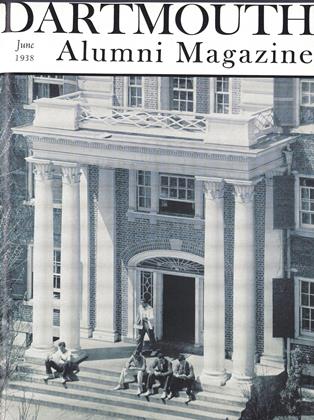TRUSTEES APPROVE PROPOSAL OF NEW NON-ATHLETIC COUNCIL;CUT SYSTEM ABOLISHED; SECRETARIES MEET
The recommendation of a new and more inclusive Council on Student Organizations, employing a full-time graduate manager and having supervisory power over non-athletic organizations similiar to that exercised by the Athletic Council over athletic teams, was made to President Hopkins early in May by the Committee on Student Organizations and was accepted by a special vote of the Board of Trustees, to become effective next fall.
The Committee on Student Organizations, under the chairmanship of Prof. Leslie F. Murch '22 a, submitted its report to President Hopkins after an investigation of non-athletic groups conducted during the past year. In the preface to its proposal of a new Council, the report stated that the present system of control was inadequate under the current expansion of extra-curricular activities, and that the new Council would make for more effective financial oversight, would encourage groups to carry out the aims expressed in their constitutions, would provide continuous directorship to ever-changing undergraduate personnel, and would better adapt the activities of groups using the name of Dartmouth to the general program of the College.
To HAVE WIDER JURISDICTION
The new controlling body of seven administrative, faculty and undergraduate members will have "general supervision of non-athletic organizations not specifically assigned by the President to the supervision of other administrative agencies," and as such will have much wider jurisdiction than the present Council, which supervises only the Players, the Musical Clubs, the Band, the Forensic Union, and the ushers for college functions other than athletic. Two members of the new Council will be appointed by the President from the teaching or administrative staff, two will be appointed as the faculty shall direct, and three undergraduate members will be appointed by the President after consultation with Palaeopitus. One of the four staff members will be designated as Chairman of the Council by the President.
Although recognizing the duty of the new Council to organize itself, the Committee suggests in its report that the Council maintain an office in Robinson Hall, to be transferred at some future time to the new auditorium, and a full-time graduate manager, eventually with a staff includby ing a stenographer and bookkeeper, a publicity manager, an equipment manager, and an undergraduate head usher. The duties of the new Council, as outlined by the Committee, would include the supervision of organization budgets and the allocation of funds appropriated by the Trustees for the support of the activities under the Council's supervision; the control of Robinson and Webster Halls and of the assignment of rooms in college buildings for use by organizations; the printing of tickets and the auditing of their sale; the provision of publicity, equipment and ushering at standard charges for all organizations requesting them; and the direction of the managerial competitions which would provide undergraduate assistants to the director of the Council.
COMMITTEE OUTLINES CRITERIA
The Committee report suggests the criteria by which the Council should grant or withhold official recognition of a nonathletic activity, and proposes that the Council have supervision of all groups coming under the headings of Functional Clubs, the purpose of which is to provide outlet for and development of artistic talents; Department Auxiliaries, the purposes of which are supplementary to a department of instruction; Discussion Groups, concerned with promoting extra-curricular interest in fields broader than departmental; Service Organizations, which administer student government and its services; and Official Subsidiaries, or organizations sponsoring cultural activities under College auspices.
These proposals would give the Council jurisdiction over the Players, Experimental Theatre, Glee Club, Band, Forensic Union, Freshman Instrumental Club, Speakers Bureau, Chess Club, Studio Group, Prokofieff, Tower, Daniel Oliver Associates, Germania, Cercle Francais, Circolo Italiano, Centro Espanol, International Relations Club, Philosophical Club, Camera Club, Radio Club, Press Club, Junto, Dartmouth Union, American Student Union, Zeta Alpha Phi, Interdormitory Council, Class organizations, Palaeopitus, Green Key, Undergraduate Fire Squad, Vigilance Committee, Handel Society, Sunday afternoon recitals, Concert Series, general lectures sponsored by the College, modern-art movies, and the Guernsey Center Moore Foundation lectures.
Detailed supervision of this large number of organizations would be delegated the Council to faculty advisers and other directors, and in keeping with this arrangement, the Committee recommends that every recognized organization have a faculty adviser upon its executive committee.
Serving on the Committee on Student Organizations with Professor Murch as chairman were Prof. George L. Frost '2l, secretary, Dean Lloyd K. Neidlinger '23, Prof. Francis J. Neef '23h, Prof. Herbert F. West '22, Sidney B. Cardozo Jr. '3B, president of the Players, Robert E. Lang '3B, leader of the Glee Club, H. Telfer Mook '3B, manager of the Band, Rodney O. Albright '39, assistant publicity manager of the Council on Student Organizations, and Carl F. von Pechmann '3B, representative of Palaeopitus.
The Committee was first appointed in April, 1937, by Prof. Allen R. Foley 'so, former chairman of the Council on Student Organizations, to study the activities of the Council. When it became evident that the Committee's study would necessarily carry it far beyond the confines of the Council, President Hopkins requested that the group enlarge its survey to include all non-athletic activities.
 View Full Issue
View Full Issue
More From This Issue
-
 Class Notes
Class NotesClass of 1918
June 1938 By Allan C. Gottschaldt -
 Class Notes
Class NotesGlass of 1929
June 1938 By F. Williams Andres -
 Article
Article"Grand Old Man" Passes On
June 1938 -
 Article
ArticleA Reply to Commencement Critics
June 1938 By JOHN B. STEARNS '16 -
 Class Notes
Class NotesClass of 1930
June 1938 By Albert I. Dickerson -
 Class Notes
Class NotesClass of 1937
June 1938 By Donald C. McKinlay








